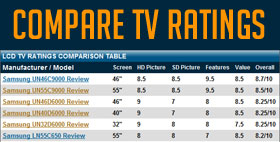Extended Warranties For LCD TV and Monitors
What you need to know about LCD Television Warranties
Reviewer: Jack Burden
It is natural for anyone who's investing thousands of hard-earned dollars in a high-end flat-panel LCD television to wonder whether it might be worth it to spring for an extended warranty. And to those people, I say, "Absolutely."
Here's why:
TV manufacturers allow for a certain number of defective pixels per unit before said unit is officially considered "defective." Since there is no way to repair defective transistors once they have been embedded in the LCD display element, any LCD monitor with an excess of defective pixels will have to be replaced. Usually, you will know whether yours is a "defective" LCD TV right out of the box -- at which point you're still covered by the manufacturer's warranty. And, since tier 1 manufacturers warrant their products for one (1) full year, you have some time to ascertain whether or not your LCD TV is actually defective, pixel-wise, at least.
You need to realize, though, that a lot can happen to LCD displays after a year of use. There might have been sufficient time for all the defective pixels to have turned-up, but other things can go wrong, too. Like your backlight dimming prematurely … or your tuner malfunctioning … or your power supply acting irregularly. You can hope that any "bugs" in your LCD TV become apparent while it's still under the manufacturers warranty. Or you can purchase an extended warranty in case they do not.
Extended warranties are like insurance: You buy it hoping you'll never need it, then you use it realizing you did.
Extended warranties are essentially service contracts, which protect you against exorbitant after-warranty labor/repair costs (which can be upwards of $250 per hour) and pricey parts (which can be quite high, for example, if you have to replace a defective backlight). There is typically only one service center per area and therefore a monopoly which is never good for the pocket book.
It really is a no-brainer, but before you buy an extended warranty:
- Make sure the warranty comes from a company that has demonstrated some staying power and has a good reputation. The Better Business Bureau has a new grading system that can help with this. One consistent performer with a good rating and price is the XpresServ warranty by DTVExpress.
- Independent warranty companies often beat the TV retailers in price. From large big box retailers to the smallest TV reseller, dealers usually make a little on the TV and tons on the warranty - marking them up 200 to 300%! Try an independent warranty company that only sells warranties (not the product) for huge savings.
- Realize that extended warranties begin after the manufacturer's warranty has ended. You can generally buy warranties in 2-, 3-, or 5-year intervals, though these warranties only go into effect after the original warranty expires. So, if your LCD TV comes with a one-year warranty from the manufacturer, and you buy a 3-year extended warranty, your TV is still only covered for 3 years from its purchase date.
Note: If the manufacturer warranty does not apply to your LCD television (because you didn't buy it from an Authorized Dealer) or becomes voided (because of misuse or outright abuse), it will not be covered by an extended warranty, either.
- An extended warranty is typically only as good as the manufacturers warranty. This is one reason to buy a better brand. Off brand TV models often come with stingy warranties of 90 days and "carry in" warranties. What you want is a manufacturers warranty with 1 year parts and labor and in home service if possible. Typically TVs over $500 will fit this description with tier 1 manufacturers.









